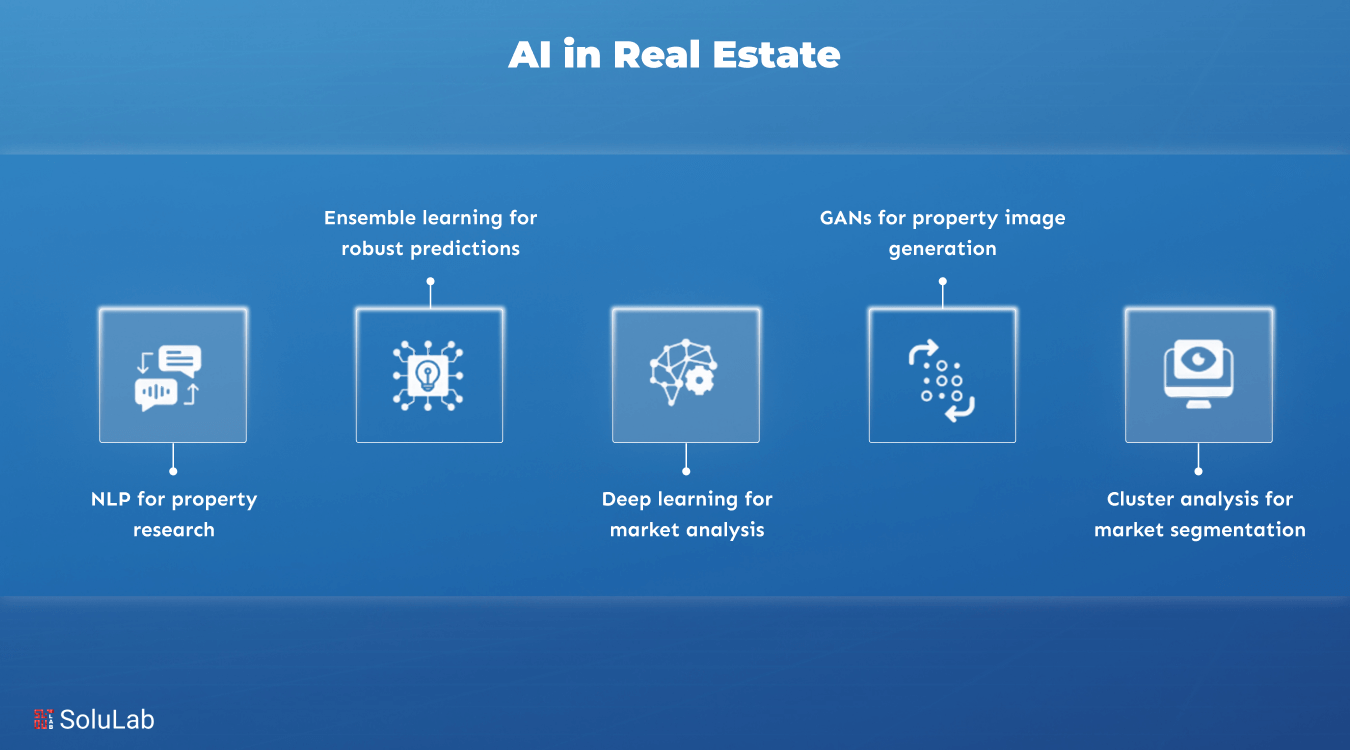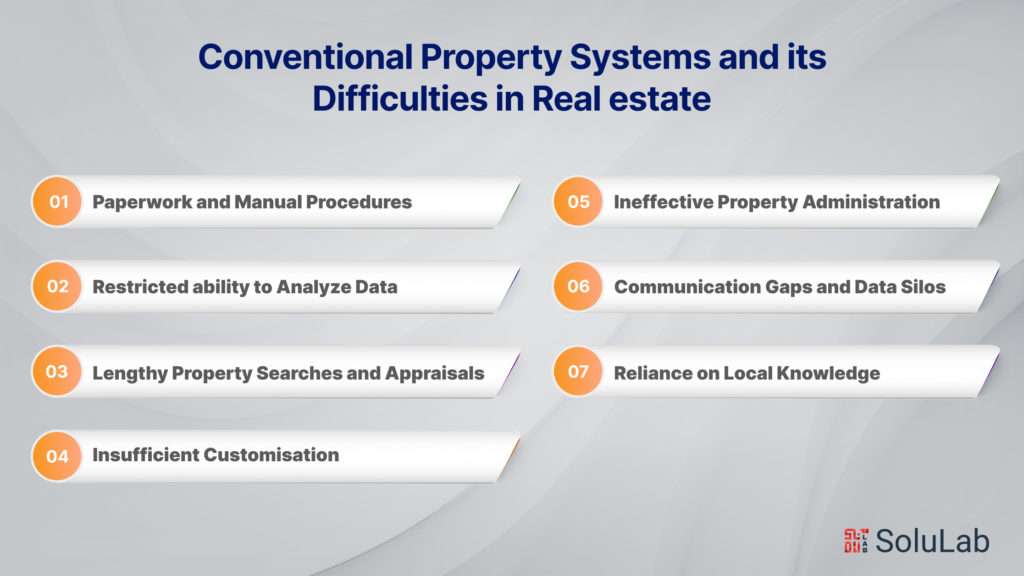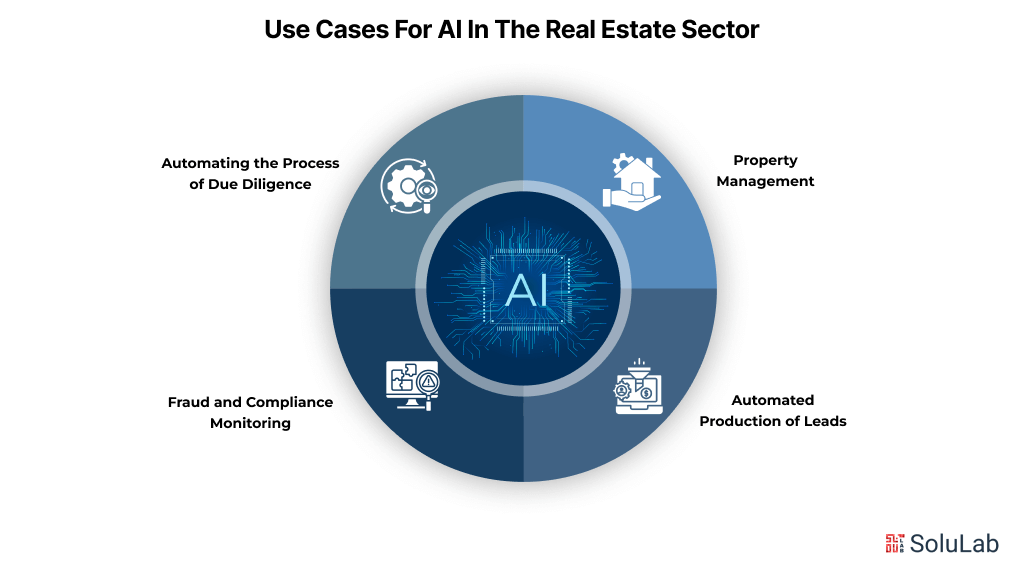
What if you could get accurate property prices in seconds, find listings tailored to your preferences, or automate tenant screening? That’s exactly what AI is making possible in today’s real estate world.
AI is changing how properties are bought, sold, rented, and managed. From chatbots that handle customer queries to predictive analytics that forecast property value trends, AI is bringing speed, efficiency, and precision to the industry.
In this blog, we’ll break down the top use cases and real-world examples of AI in real estate to show you exactly how it’s changing the game. Whether you’re a buyer, seller, or investor, this is worth knowing.
What is AI in Real Estate?
AI in real estate refers to the use of artificial intelligence technologies, like machine learning, predictive analytics, and computer vision, to improve various aspects of the property industry.
Buying or selling property has always been complex—long searches, vague valuations, and endless paperwork. For real estate professionals and homebuyers alike, the process can be time-consuming and confusing.
From helping buyers find the right property faster through personalized recommendations to automating property valuations, AI is changing how the sector operates.
| Global AI in the real estate market grew from US$222.6 bn in 2024 to $303.1 bn in 2025, at a CAGR of 36.1%. |
Real estate companies use AI for market forecasting, lead generation, chatbots for customer service, and even for analyzing images or floor plans to extract insights. It’s also being used to evaluate land prices, detect fraud in documentation, and optimize property listings, making the buying, selling, and renting process much more efficient and data-driven.

How Does AI Work In Real Estate?
1. Property Recommendations: AI analyzes user behavior, preferences, and past searches to offer personalized property suggestions. This helps buyers or renters find suitable options faster, improving the overall experience and reducing time spent on irrelevant listings.
2. Price Prediction & Valuation: Using historical data, market trends, and location-based insights, AI tools can estimate property prices more accurately. This helps buyers avoid overpaying and allows sellers to price their property competitively based on real-time market data.
3. Chatbots & Virtual Assistants: AI-powered chatbots provide instant customer support by answering queries, scheduling site visits, and sharing property details 24/7. They reduce the dependency on human agents and ensure smoother communication for both buyers and sellers.
4. Fraud Detection: AI systems can scan documents, verify identities, and detect inconsistencies in property listings or transactions. This reduces the risk of fraud and ensures transparency in the real estate buying or renting process.
5. Predictive Maintenance in Smart Buildings: Enabled systems in smart buildings monitor equipment performance and predict maintenance needs. This helps property managers reduce downtime, save costs, and offer a better living or working experience for occupants.
Conventional Property Systems and the Difficulties They Encountered

The global economy has traditionally relied heavily on the real estate sector, which links buyers and sellers looking to purchase homes, businesses, or assets for investment. Real estate has traditionally been bought, sold, and managed mostly via manual labour that requires human skill and effort. But the incorporation of artificial intelligence (AI) has had a big influence on the real estate industry lately, changing the way properties are looked for, assessed, and maintained.
- Paperwork and Manual Procedures
Real estate transactions used to need a lot of paperwork and human labour. Administrative duties took up a significant amount of time for real estate agents, ranging from filling up property listings to handling contracts and paperwork. Due to the manual process’s time-consuming nature and increased chance of error, real estate transactions experienced delays and inefficiencies.
- Restricted ability to Analyze Data
It was common for traditional real estate systems to lack advanced data analysis features. In order to make conclusions about property assessments, market trends, and investment prospects, real estate professionals had to depend on their expertise and intuition. Inadequate data analysis resulted in poor decision-making as important insights from big datasets were not fully exploited.
- Lengthy Property Searches and Appraisals
Finding the ideal property for a buyer requires either manually perusing listings or physically seeing many houses. Variations in property prices resulted from the subjective and human appraisers who conducted many property appraisals. Inefficiencies in the real estate market were caused by these laborious and arbitrary procedures.
- Insufficient Customisation
Property searches and suggestions in AI for real estate systems were frequently impersonal. It was difficult for buyers and investors to identify houses that exactly met their requirements and tastes since they had to rely on generic ads and suggestions.
- Ineffective Property Administration
Managing a property required a lot of work and entailed balancing a number of duties, including upkeep, collecting money, and communicating with tenants. It was difficult to streamline property management procedures with traditional methods, which might have resulted in inefficiencies and higher expenses for managers and owners of real estate.
- Communication Gaps and Data Silos
Various real estate business stakeholders frequently dealt with disjointed, non-integrated data systems. Property transactions were delayed and complicated as a result of the breakdown in communication and lack of transparency that resulted between buyers, sellers, brokers, and property management firms.
- Reliance on Local Knowledge
Conventional real estate systems mostly depended on local knowledge and experience. Although local knowledge is vital, it may restrict prospects for investors and companies to thrive by restricting the possibilities for larger industry insights and trends.
These difficulties offer chances for AI integration to rectify these flaws and realize the full potential of the real estate market as it develops. In the real estate sector, artificial intelligence (AI)-powered solutions may boost productivity by streamlining procedures, enhancing data analytic skills, offering personalized experiences, and more. Real estate professionals may more fully recognize the benefits of artificial intelligence (AI) and seize the chances for innovation and expansion by being aware of the shortcomings of conventional methods.
What Flaws in the Current Real Estate Systems Can AI Fix?
The following are some ways that AI integration can successfully handle the issues raised by conventional real estate systems:
-
Automation and Digitalization:
By digitizing paperwork and automating manual operations, artificial intelligence (AI) lessens the administrative strain on real estate workers. This expedites real estate transactions, reduces mistakes, and simplifies processes.
-
Advanced-Data Analytics:
AI is capable of swiftly and correctly analyzing large datasets, which yields insightful information on market trends, investment prospects, and property appraisals. Decisions about real estate are becoming more educated and data-driven.
-
Improved Property Search:
AI-driven solutions provide effective methods for finding properties, saving time and effort for investors and purchasers. The process of finding a property may be made better by machine learning algorithms, which can recommend properties that fit certain needs and preferences.
-
Personalization:
AI-powered systems have the ability to customize real estate suggestions by adjusting listings based on user preferences. This guarantees that guests locate homes that suit their particular requirements, improving their experience as a whole.
-
Effective Property Management:
By automating processes like rent collecting, maintenance scheduling, and tenant communication, artificial intelligence (AI) may improve property management. Smoother property operations and cost savings result from this.
-
Communication and Data Integration:
AI systems are able to combine data from several sources, which promotes improved stakeholder transparency and communication. As a result, there are fewer misconceptions, hold-ups, and data silos in the real estate industry.
-
Broader Market Insights:
Artificial intelligence goes beyond regional specialization to provide broader market insights. By analyzing data from larger geographic regions and spotting new trends, it enables investors to investigate potential new growth prospects.
By streamlining processes, strengthening data analysis, personalizing interactions, and increasing overall efficiency, AI integration has the potential to completely transform conventional real estate systems. The real estate sector may overcome its past obstacles and open up new avenues for development and innovation by embracing Hybrid AI technology.
Use cases for AI in the Real Estate Sector
The real estate sector has been greatly influenced by AI, which has produced a variety of use cases that have improved client experiences, reduced procedures, and improved decision-making. Here are a few thorough examples of AI applications in the real estate sector:

1. Property Management
In the real estate market, efficient property management is crucial, especially for complex and rental property managers. However, AI has created a new solution that has improved property management and the real estate business. AI technology can automate many property management operations, reducing property managers’ workloads. Automation reduces their burden and reduces human mistakes, which can cause late rental payments, accounting issues, and tenant conflicts. AI could improve property management in the real estate industry.
2. Automated Production of Leads
AI for real estate lead generation has improved conversion rates and reduced procedures. Manual lead classification and examination often result in inefficiencies and missed opportunities. Real estate automates lead generation with machine learning. AI systems evaluate large databases for leads based on web behavior, property preferences, and demographics. This lets agents better target prospects and adapt marketing campaigns. AI’s predictive analytics can help agents prioritize high-potential leads and manage resources.
3. Fraud and Compliance Monitoring
Artificial intelligence and machine learning are being used to address the challenges caused by the rise of AI-generated content and edited images in real estate listings. AI’s ability to detect and assess fraud ensures listing data accuracy and helps brokers, administrators, and MLS providers maintain corporate integrity. By applying AI for fraud detection, real estate agents can proactively address Fair Housing Act compliance issues and reduce the chance of erroneous listings. This use case shows how AI guards against legal issues while maintaining real estate confidence and openness.
4. Automating the Process of Due Diligence
Because human data input is inaccurate, AI offers a solution. It checks loan applications and leasing agreements for flaws using big datasets. The loan approval process relies on AI to identify discrepancies between paper values. By adopting this step, you improve due diligence and reduce loan sanctioning fraud. Automation of due diligence by AI shows its revolutionary potential to improve accuracy and minimize risk in complex real estate deals.
Real World Examples of AI in Real Estate
AI is already improving the real estate industry through platforms that use data-driven insights and automation to improve decision-making, pricing, and customer experiences. Here are some real-world examples:
-
Zillow
Zillow uses AI for its “Zestimate” feature, which provides real-time property valuations by analyzing data from public records, user-submitted information, and market trends. It also uses AI to match buyers with suitable listings based on their behavior.
-
Entera
Entera is a real estate investment platform that uses AI to help institutional investors find, evaluate, and buy residential properties at scale. It analyzes market trends, property data, and investment potential to recommend profitable deals.
-
Trulia
Trulia uses AI to personalize home search experiences by learning user preferences and delivering relevant property recommendations. It also integrates machine learning to provide neighborhood insights, pricing trends, and commute analysis for better decision-making.
Conclusion
AI is changing the real estate industry by making processes faster, smarter, and more customer-centric. For investors, buyers, and sellers alike, these advancements mean better decision-making and increased efficiency. As the technology evolves, its role in real estate will only grow stronger, making it essential for industry players to use AI tools to stay competitive and meet the demands of a data-driven market.
Digital Quest, a travel business, partnered with SoluLab to develop an AI-powered chatbot using Generative AI. The chatbot enhanced customer engagement by offering real-time, personalized travel recommendations and hassle-free reservations. It also integrated user feedback and multi-language support, resulting in improved user experience and high ROI.
SoluLab, a leading AI development company in the USA, can help your business make smarter real estate decisions and choose the most effective tools for your needs. Get in touch with us today to explore how we can support your goals.
FAQs
1. What are the benefits of AI in real estate?
Discover the advantages of AI for real estate, including improved property valuation accuracy, enhanced customer experience through personalized recommendations, and optimized property management processes.
2. How is AI used in property valuation?
Learn how AI algorithms analyze vast datasets, including market trends, property characteristics, and comparable sales data, to generate accurate property valuations and assist in investment decisions.
3. What are some practical applications of AI in real estate transactions?
Explore the various applications of AI in real estate transactions, such as automated document processing, predictive lead scoring for sales and marketing, and virtual property tours using AI-powered virtual reality (VR) technology.
4. How does AI assist in property management?
Understand how AI tools and platforms help property managers streamline operations, optimize maintenance schedules, predict equipment failures through predictive maintenance, and improve tenant satisfaction through personalized services.
5. What does the future hold for AI in real estate?
Explore future trends and advancements in AI technology that are poised to transform the real estate industry, such as AI-powered real estate investment platforms, predictive analytics for property market forecasting, and AI-driven sustainability solutions for buildings.






